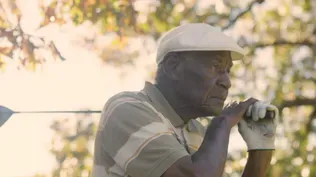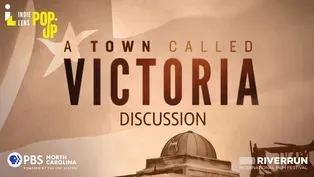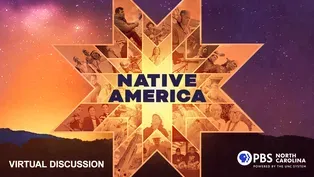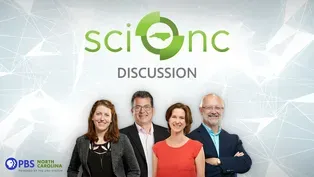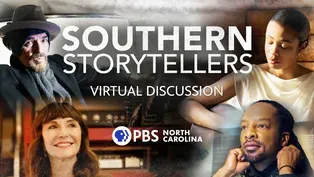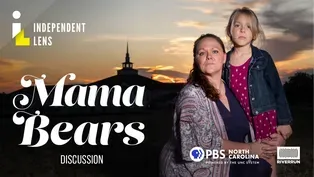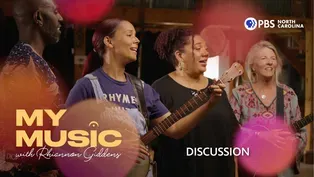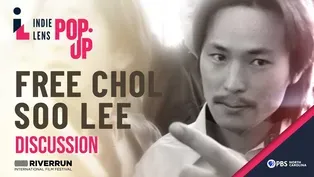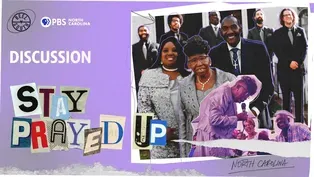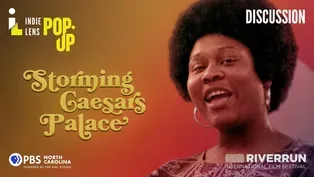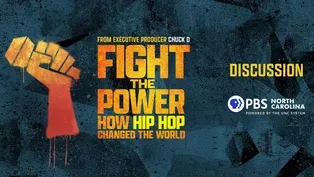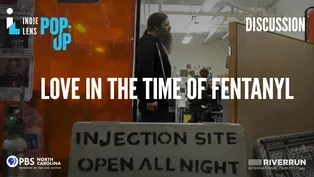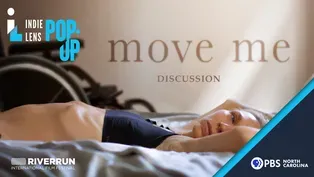PBS North Carolina Specials
Discussion | Muni REEL SOUTH Screening
3/30/2021 | 38m 35sVideo has Closed Captions
Discussion with the filmmaker, Paul Bonesteel, and featured golfer, C.Y. Young.
REEL SOUTH series producer Nick Price leads an engaging discussion with Muni filmmaker, Paul Bonesteel, and golfer C.Y. Young (featured in the film), highlighting how this story came to film, the history of the groundbreaking Skyview Annual Pro Am Golf Tournament and the state of golf in Asheville today.
PBS North Carolina Specials
Discussion | Muni REEL SOUTH Screening
3/30/2021 | 38m 35sVideo has Closed Captions
REEL SOUTH series producer Nick Price leads an engaging discussion with Muni filmmaker, Paul Bonesteel, and golfer C.Y. Young (featured in the film), highlighting how this story came to film, the history of the groundbreaking Skyview Annual Pro Am Golf Tournament and the state of golf in Asheville today.
How to Watch PBS North Carolina Specials
PBS North Carolina Specials is available to stream on pbs.org and the free PBS App, available on iPhone, Apple TV, Android TV, Android smartphones, Amazon Fire TV, Amazon Fire Tablet, Roku, Samsung Smart TV, and Vizio.
Providing Support for PBS.org
Learn Moreabout PBS online sponsorshipMore from This Collection
Discussion - A Town Called Victoria - Independent Lens
Video has Closed Captions
The filmmaker and former Victoria residents share their story. (46m 51s)
Discussion - Native America Season 2
Video has Closed Captions
Panelists discuss preserving the languages of Native American tribes. (39m 1s)
Video has Closed Captions
Sci NC executive producer and host, Frank Graff, chats about upcoming Season 6 of Sci NC. (26m 6s)
Discussion - Southern Storytellers
Video has Closed Captions
Author David Joy and others discuss storytelling and their new PBS series. (42m 13s)
Discussion - Mama Bears | Independent Lens
Video has Closed Captions
Producer and director Daresha Kyi discusses the film and LGBTQIA+ advocacy. (34m 41s)
Discussion - My Music with Rhiannon Giddens
Video has Closed Captions
Discussing the series with producers Will & Deni McIntyre and country artist Rissi Palmer. (39m 56s)
Discussion - Free Chol Soo Lee | Independent Lens
Video has Closed Captions
Local lawyers, professors and nonprofit leaders discuss wrongful convictions and reentry. (40m 44s)
Discussion - Stay Prayed Up, Reel South
Video has Closed Captions
The filmmakers discuss their journey with Mother Perry and The Branchettes. (45m 4s)
Discussion - Storming Caesars Palace | Independent Lens
Video has Closed Captions
Local professors and nonprofit leaders discuss welfare and the social safety net. (33m 2s)
Discussion - Fight the Power: How Hip Hop Changed the World
Video has Closed Captions
Local experts discuss the history of hip hop with PBS North Carolina. (59m 43s)
Discussion - Love in the Time of Fentanyl | Independent Lens
Video has Closed Captions
Local harm reductionists, therapists and others discuss the opioid crisis and more. (55m 44s)
Discussion | Independent Lens: Move Me
Video has Closed Captions
A dancer with blindness and disability advocates discuss adaptable arts programs. (38m 46s)
Providing Support for PBS.org
Learn Moreabout PBS online sponsorship- Hi everyone.
I just wanna start off by saying...
Thank you so much.
I'm Nick Price, I'm the series for producer for Reel South.
Thank you all for joining us this evening.
I'm thrilled to be here representing one of the nation's largest PBS affiliates.
That's PBS North Carolina, and presenting our really special film.
That's local to our state and new season six of Reel South.
Some of you may know from our graphics but just so you're aware Muni kicks off Reel South on our upcoming season next week, and that kicks off across the country, starting on Monday April 5th for online platforms.
But for my NC folks who are here tonight, you can tune in on broadcast and watch Reel South and watch Muni and other films starting Thursdays at 10:00 pm April 8th on PBS, North Carolina.
With that, I wanna say welcome Paul' Paul Bonesteel.
Let me give you a brief introduction.
Paul Bonesteel hails to us from Asheville, North Carolina.
He has some of a, PBS North Carolina's grandest of roots.
He comes from a public media legacy of family that I can't wait for him to tell you about.
But Paul, I want you to just give us a brief introduction to yourself and maybe you can help us introduce one of our really dynamic characters from the film C.Y.
today.
So, Paul welcome.
Thank you for joining us.
- Thank you.
It's great to be here.
Fun to see the, the Reel South version of this film and get out there.
I am Paul Bonesteel.
I grew up here in Asheville or Hendersonville actually and I was telling the folks earlier I went to school at NC State back in the '80s.
And I learned quite a bit there, but been making films for about 30 years.
And I was fortunate to just, right in my backyard right on the golf course on play, find some lovely characters in a really cool story and C.Y.
Young is one of those guys who you saw in the film.
And he joins us tonight as well.
Glad to have him in the film and all the guys you saw from Billy Gardenhightú to Dwight Bryson and just a fun cast of both locals.
And then some of those guys who had traveled to the Skyview for years and years, who I caught a couple of different Skyviews over the years.
So C.Y.
you wanna say hello?
- Hello.
I am C.Y.
Young, and I'm so happy to be here today Paul.
Thank you very much.
- C.Y.
thank you.
I will let you introduce yourself a bit more and tell us more about where you're from where you're, tell us a little bit more about how you met Paul?
But I just wanna hear a little bit more about you that we didn't get to see in the film.
- Okay.
It wasn't told, I was born in a small town in Sylva, North Carolina.
My mother's mother was Cherokee Indian.
Her father was white, and my dad's dad was from Burnsville North Carolina, and he was Black.
And guess what?
He was married to a colored woman.
And make no mistake about it.
It helped me throughout my lifetime to be able to treat people with respect.
No matter what color they are or anything.
So being in Sylva, North Carolina we had an all Black school and 1959, I graduated from high school.
I don't know how, but I graduated.
And then the thing was, I went to Western Carolina University and worked in the cafeteria there for four years.
And then the lady [mumbles] told me that DuPont was hiring Afro-Americans to work in productions in 1963, and I got on at the plant and I enjoyed, the people enjoyed.
I learned how to play golf, working at DuPont cause all I thought about was playing baseball, football, basketball, and bowling.
And then one day, a guy introduced me to playing golf, and I thought that was the most stupidest game I've ever seen in my life.
I said," Why in the world, they put me in something like this?"
And guess what?
That's my lifestyle now.
I work at Muni Golf Course three days a week to greet people, to enjoy people and let them know that golf is a wonderful game, no matter what your score is.
That you have to understand that being out here to enjoy yourself.
That's what it's all about.
It doesn't have to be about your score as much as about what you're doing.
Now.
I know some people say, "Oh I want to shoot a low score."
but you're not gonna shoot a low score every day.
And that's my lifestyle.
I teach people when they come out there.
I tell them, I say, "I want you to enjoy today and just have a beautiful time."
You know what I'm saying?
Just have a beautiful time.
- I do.
That's really great.
I'm glad you're starting to really talk about more about your golf course and the community there.
And I guess I know about one question that's probably on top of everyone's mind at this point in the year and having been through most of [indistinct] - 25.
- [mumbles] the rest of the charismatic gentlemen in the film.
How have they faired this past year?
And how are things now?
- Things are different now because we don't have that many Afro-Americans playing in it anymore.
It's unreal.
And I don't know what happened.
I have no idea, but we just have a few.
I think it's because of the age limit the people just moved away or died or whatever.
And we just don't have that many anymore, but however I keep promoting the idea that, "Hey, golf is for everyone.
It doesn't matter who you are, whether you're female, male or whatever."
But it's got to do with you enjoying the game of golf and we need to get more people into it.
Now we've got the Skyview coming up in July.
I don't know whether you know about that or not but it's coming up in July 2nd week in July.
And hopefully we can have some wonderful people coming back to see us and visit us.
- You know, there's a - I love the game Paul.
- I know you do.
There's certainly Nick, a big hope that the Skyview as a tournament can become something like the event it was, you know, back in the day, but the, as they described in the film, I mean things have changed a little bit, but C.Y.
don't you think there's still a pretty good representation out at Muni though, of Black golfers?
- Yes.
It is.
You'd be surprised on the Mondays, on Wednesday, Friday, Saturday, Sunday, and all of the days that they are there.
And they come from Allentown and different places just to know that Muni is a very unique place to come and a place to visit and see people you haven't seen in a long time Paul.
And it's just miracle.
It's awesome.
I mean, you know, it gives me goosebumps just thinking about it.
How great it is, man.
I'm telling you right now.
And the people is just out of sight, like you, for instance and the people that you brought in here today I feel like I'm a millionaire.
[all laugh] because I got invited to a beautiful team.
That's all I had to say.
- Paul, I wanted to ask, I think that one really important part of this film that I wanted to address was, and really to talk to you about and C.Y.
this is for you as well, but I feel like one sort of media narrative that's been missing around Asheville, around Western North Carolina are stories from the Black community.
And I'm just, and even parts of Appalachia as well.
And so I just wanted to know if that did that contribute to you wanting to really tell this story on and did it guide your filmmaking in this [mumbles]?
- You're talking to me or Paul?
- Both of you.
- Oh, well... - Do you represented as a Black person from Western North Carolina in media, and Paul did that guide you in making this?
- Yes, it did for me and to have Paul to invite me to all the people that he didn't talk to.
And he didn't just talk to one person.
He talked to a whole bunch of people and he got good stories and all of them were great.
And that made me feel so good to know that someone wanted to represent the Black community and playing in a beautiful golf course.
And I'm not saying that as a, to be pitiful enough.
And I'm saying that to be a wonderful aspect of the Black community because we just don't have that many here anymore.
And we, the White people have been great to us.
I'm telling you now, and I'm not prejudiced at all.
I'm telling you what I know and feel, they have sponsored us and they have done a great job with us.
And I am just so happy that they want us back.
They want the humanity to bring the Blacks back in and play golf.
But guess what?
We just don't have it no more.
We have a few, but not like it used to be.
And I'm pushing to have more, but I got Paul and you and the young lady sitting here to invite us to do better.
- Nick, on that wavelength, you know, a number of things about the area did motivate me, you know and if you talk to many people around Western North Carolina, you do hear that the Black stories have been underrepresented for quite some time.
You know, there's, as a lot of cities and communities are dealing with, there's a lot of reflection right now about, about what the modernization of many cities did and destroyed a lot of Black neighborhoods.
And that was it, that happened here in several neighborhoods of the folks that I interviewed, where, you know, the Interstate came through and the entire neighborhood got destroyed.
And so it was definitely on my mind to look for a story that would have resonance beyond a golf story.
And I wasn't really even looking for a golf story but when the things triangulated and it was like, once I knew folks like C.Y.
and Billy and all these other guys had lived this story, and it was woven into the game that they're so passionate about for me, it was like, it was really cool because it allowed me to enter this conversation in a sport that I was familiar with and shared commonality like the fact that we play the same game and have the same frustrations was common ground immediately, you know?
And so we could talk the game and then we could easily trans kinda, you know, into deeper conversations which I had plenty of before we started making the film.
I didn't know if I wanted to make this film, not because it wasn't a great story, but I just didn't know if I was the right guy.
And I started asking folks like Billy, and I was like," You know, this story needs to be told.
Are you okay with me telling it?"
And folks like C.Y.
and the others encouraged me.
And that made me motivated.
When I have someone that, I kinda love having someone expecting something of me.
And when those guys, when we had this relationship for him and basically I knew that I was putting myself in a position to represent them and tell this story, then it got both fun and, you know a little more serious.
Like I, it was a very important role that I had to play and so.
- That really brings me to another question.
And it's really about the filmmaking here.
How did you balance but telling them a story that's super local to Asheville but also really speaks to the region and also really elements of a global sport.
- You know, a lot of that just kind of fell into place because the game is such a, is has so much history has been played for a long time.
And you know, the point I do try to make in the film affordable public golf is really what Muni is about.
It's not about fancy golf.
It's not about rich people's golf.
It's not about White people's golf.
It's about the game that was really designed to be played in cow pastures.
And, you know, and, you know, along the coast of Scotland by average people.
And then when it came to America actually was, [indistinct] at Muni in the '20s was open to the public.
Now that, a lot of people may not have that perception of golf.
And, but that is the case.
And there Munies all across the South and across the country, there are low priced public, and an affordable golf courses that gather folks like C.Y.
together, and they share this bond and they share this place.
So in that sense, it is a universal story but then when it got, we got serious and we got personal about, for me, Asheville, and about what desegregation, what segregation was like.
And then what desegregation was like for the blossoming of the Skyview and how this, looking at it tonight and seeing these pictures like the one behind you, of these guys.
They're so proud to have a golf tournament that is their golf tournament, you know, and you can just see it in all the photographs, but that was what was so important about that time.
Like all of a sudden, you couldn't even play but one day a week, if you were a caddy and then the course opens up and the competition starts and the tour and the circuit happens on all these small golf courses and there's purses, there's money out there.
And you know, it's just, that was an important event.
And yeah, lot's changed and lot's gone both good and bad since then you know but I wanted to celebrate that moment and think about you know, what's next?
- Sure.
- How can we really be as dynamic of a country as we can be?
You know - Speaking of dynamic, that's the buzzword, I added my next side, C.Y.
I think the most obvious takeaway from this film is how dynamic the Black community is at Muni.
And I'm just curious, what's your experience around the South or at other municipal golf courses?
Are you, have you seen other or been around other as vibrant communities as the one that you have?
Or would you say that the one in Muni is unique?
- It is very unique, very unique very seldomly you have a tournament that was predominantly made by Black folks, and it's just, it's just something that's so exciting.
And it's so wonderful that Paul brought this to a lot of people's attention.
You would be surprised how many people come to the golf course, and I'm a starter and they come to me and they call me a star, a movie star.
And I'm not a movie star.
I just try to explain to people what's going on.
And man, I'm telling you, that's the gray.
I've been living a long time.
I'm 80 years old now.
And I'm telling you right now the greatest feeling that I got was when Paul introduced me to this movie and got me in it.
And all of a sudden people are coming up to me calling me a movie star and stuff, and I'm looking around and I'm like, what are they talking about?
I'm not no movie star [laughs] [mumbles] loving people and caring for them and trying to get them into the game of golf.
That's mainly it.
I love people.
And Paul, he, I can't say enough about him.
He's sensationally great.
And Nick, I am so happy that you brought us up today to talk about this.
- Oh, no.
We're glad that you're here.
Paul, in your research for this film.
Well one, I wanna know what your research was like specifically around the photographs that we see both in my graphic behind me, but throughout the film?
Were these mostly personal photos?
Were they in archives?
What was that research like?
- You know, gosh, that the fact that we have a film at all right now to watch, almost 80% of the photos that are in this film I did not know they existed when I started the project.
And I was really concerned.
I knew, I, you know, we had these really low quality printed kind of like programs that the Skyview would put out from the '60s on.
I knew there were photos out there but nobody in the Skyview Association could remember or know where the archive went.
And all we had with these really low quality prints.
So I knew there were photos.
And then I started getting into the newspaper archives and I found a treasure trove of photographs in the local Asheville paper archive.
But it was only because some of those photographers above and beyond [indistinct] to go to the golf course to shoot.
They shot more than they normally would.
And whether it was cause it was a nice day out or whether they knew that something special was going on at that time.
And they were documenting it.
I had to go into the archives of the Asheville paper and find the negatives on the day of the tournament or the day after the tournament and actually scan them, while I stood there in most cases in the file drawer and I just was elated every time I left there when I found another stack of negatives, I was like, I could see the film coming together, you know like the ones you saw because those guys were professional photographers you know, it's all black and white until they got to the '90s or so.
And, they had an eye and they saw things, Like the shot behind you, that was more than golf.
I think they were taking photos that were about more than golf because it was unusual, you know, to have a tournament like this.
But the Skyview, you know, it continues and it will continue, you know, last year because of COVID it was just too complicated to try to pull off, the course was open.
But this year, hopefully it's back.
- Yeah.
That's a great point because there's a lot of write-ups that are circulating the past six months or so about how sports like golf and some other more individual sports are really seeing an uptake because of the pandemic.
And I'm just curious if that's represented at Muni as well.
- [laughs] I think C.Y.
can speak to that.
It's been crazy out there, right?
- Yes, it has.
I tell you what today we had high school players playing a tournament, and then later on we had these VA people coming after to play at five o'clock, man.
They about kill me out there today.
You would not believe how many people were out there.
And you know what, I think I probably sit down 10 minutes the whole day.
You know what I'm saying?
- 10 minutes.
- And that was the eat my lunch.
That's a fact.
- You know, the course was closed for like a week as the city sorted out how to manage it in COVID.
But since then, I've seen, you know a lot of people out there, the course even before COVID was heavily played.
I mean, it speaks to the need that, you know, the, for public golf, the fact that how busy it is affordable public golf, and I have to keep saying that word because there's a lot of courses you can play for 30, 50, $80 around.
You can't play very often if you're middle income, you know, at that price, you know and that's, Asheville built that course back in the '20s for just that reason.
So that it could, you know be played by the average person.
And that's an important message in the film among other messages.
- Yeah.
No, that's definitely something thinking about the barriers to this sport.
See why I'm just curious, what do you think Asheville or Muni or other communities that are aspiring to the success that y'all have had, you know, what can they do more of to increase the participation especially among the youth, or especially among Black youth to really participate more in golf.
- We have to introduce it in the school system.
I mean, you know, Nick, if it's not in the school system now the kids think about baseball, football and that's mainly what they talk about.
They don't talk about golf.
And when you say something about the golf, they look at you, like, you're crazy because they're just not into it.
Like we were, I wasn't into it until I was 50 something years old.
So, I mean, you know, it, I understand the criteria around it it's just that the ladies league was there this morning.
Do you know?
I had 30 ladies play in their tournament that this morning At 9:30, ladies, and it was only one Black lady playing.
What does that tell you?
We don't have a lot of people that is interested in the game that is a Afro-American or anything.
Most of them, I am so proud to know that they treat us with so much respect.
They treat me like I'm family.
And that makes me feel, "Hey, let me tell you something, brother.
If I die tonight, I'll be happy to know that I have met some of the best people in the whole world."
And are one of them.
Paul's one of them, the young lady sitting here.
I mean, that's the way people treat me.
They treat me like, I'm a hero and I'm not no hero.
I just love to tell them what's going on.
- Well, it sounds like they need to send you around to the schools and just recruit the students to come and join you at the golf course.
- I don't mind talking them.
I can tell you that [laughs] - I have, I wanna acknowledge that we have some questions from the audience here and really just kind of go to these, one question that come up that I think you were starting to hint that there C.Y.
is about women and the participation at Muni and especially among Black women and the lack of participation there, you know can you speak to, you know, any efforts there or tell us a little bit more about the women at Muni, especially during this era and what that was like, you're on mute.
- They're are absolutely awesome.
They come out there, they enjoy their self and the Muni Golf Course invites them out and they just go awesome for it.
And they have a little bit of food after they get through playing and talk to each other about their meetings and stuff like that.
And the days that I've been there, it's been awesome.
I mean, it's just, it's amazing.
And it gives you a chill bumps, just thinking about how to bring more people back into the game.
But with this thing going around it's hard to get people involved in going out and being publicly with other people.
And I noticed that the football games is coming back live.
But that's just a small percentage, okay Nick.
Golf is my livelihood.
And I just, if anything happens to me and I die on the golf course, I'm gonna be a happy camper.
I'm just telling you because golf made my lifestyle for me.
And I can't say it no better than that.
- Paul, what did you learn about women's involvement in Muni especially even during this [mumbles] era?
- Yeah you know, the photos speak, and some of the guys I talked to speak definitely to not just the support and the social aspect of women involved in the event, although they were, they loved kind of watching and the events that surrounded it during its hay day '60s, '70s into the '80s.
There were big events, parties that went on as mentioned in the film, but they have had women competition.
They haven't had it for a few years and they hope to do that.
Soon as the kind of tournament continues to kind of come back both in kind of a strong organization as well as a youth, you know, category which they have had before too.
But right now the push is to really formalize the you know, the men's category first or to, you know and one thing about the youth, some of these guys both Billy and Baxter were teaching here.
I say here near where my office is.
There's a couple of community centers where they would get kids together.
That unfortunately kind of faded out.
They ran out of space to do it.
And, but the need is there to, The Muni has a youth program and as shown in the film, there was a scene there with a bunch of kids hitting golf balls.
And there wasn't a Black kid in the whole crowd.
And I asked about that and you know and unfortunately it's about, you know, transportation, it's about timing, it's about, you know people being able to get there and stuff.
And you know, it's not treated quite the same as other youth sports.
And like, see what I said, it needs to be for... You gotta, you gotta learn this game young, obviously C.Y.
's as a proof of that.
But it helps if you start young.
Cause you figure out early, how fun it is and how much you enjoy being on the golf course, yeah - One question coming from the audience was about the, in your research or maybe see from your knowledge or experience, you know, were there golf, what was it like at Muni in terms of the resistance to the integration.
And did you, what did your research or your storytelling tell you, tell us about that.
Did White people stop playing golf for a while at Muni?
Did they just kind of move past it?
I mean, right now we're in a much better place but in the late '60s and '70s, what was that like?
- Well, I didn't come over here in the '60s or '70s.
I came over here in the late '80s and early '90s and being, they treated me like I was a foreigner.
Now you may not believe this but I was treated more so better by the White organization that I was the Black.
So they didn't know me.
They didn't know who I was, what kind of person I was or what have you.
But after playing golf with them and they found out that I was just a normal person, then they said, "Okay we are going to do this thing the right way, okay."
And we're gonna let people know that, "Hey everything is the same."
Because when I played in the game now you know who I played with?
All I got to play with was White guys.
None of the Black guys would ask me to play because I was not from Asheville, North Carolina.
I was from a small town, Brevard, North Carolina.
And I mean, that's just the way it was.
And after they learned that, Hey it's golfers coming from Asheville.
It's golfers coming from Hendersonville and small towns, you know, like that.
And Bryson City and Franklin and stuff like that.
And we started communicating better and started getting more people involved in it Nick.
I don't know how to explain it any better than that but they had to see what it meant to play golf and what it meant.
Don't matter what color you are.
It's got to do with your attitude, towards treating people with respect and enjoying the game of golf.
I can't explain it no better than that.
Just to explain this, that's just the way it is.
And it's getting better.
Believe it or not.
Cause I'm seeing more young men and you asked about Black guys?
I see more younger Black guys playing golf now than I did 20 years ago.
Now... - That's great to hear.
- I don't know how to explain it better than that.
In fact, I talked to five this morning and they were telling me, "See why we so happy to see your man.
So, you know, you are movie star."
I said, "I ain't no movie star.
I'm just a normal person that enjoys people."
" Yeah we know that, but you the reason why we are here."
Now that's what they told me.
And about fainted when they told me that today.
And they asked me, "Did you enjoy my card that I give you for your birthday?"
I said, "yes, I did."
I said, "that was beautiful of you."
He said, "well, we think a lot of you."
I said, "well, if I was running for president [laughs] of the Muni Golf Course [laughs] maybe I'd be the president, but I don't wanna do that.
I just want to enjoy people.
I just want people to come and enjoy the game that [mumbles] that's all.
[mumbles] - Hey, Nick, a quick comment on that from my conversations with the folks that that went through the, from basically they can play any time.
There was a fair bit of resistance, you know, and some of it was overt and some of it was more subtle.
The neighborhood was really unhappy because they didn't like Black people playing the golf course around their house.
There were articles in the paper.
There was a very sort of subtle, but clear racist kind of tone about it, about the desegregation of golf and Muni.
And there was the movement to try to for a private group to buy the course because they were that unhappy with it.
They wanted to control it.
You know, this is a story that often you'll hear during this time, you know, where people just resisted it because it was a big change and they weren't prepared for it.
But again, I've heard an equal number of stories to be fair of the guys that caddied for White guys who were treated, you know, really well and with no condescension who, who were, you know, tipped, abundantly who were given golf clubs, who, you know, and so that's out there too.
I think it's, I have to be fair to say.
I heard those stories too where the guys at the fancy golf courses around here like it was a mixed bag, as it said in the film, some were treated really well and some were not.
And, but was there a little pushback?
I did hear that, you know, as soon as the the Black folks started playing a whole lot that there was some pushback and the White folks, some of the White folks were looking for other courses to play, you know, and but clearly it didn't stop the Skyview from happening and the kind of just general comfort.
It took a few years.
It took a few years.
- Yeah, I think that's great.
And I know that we have, we're running out of time here so I'll just kind of have leave this at one last final question.
There were final thoughts from both of you but I guess I'm just curious, Paul, as the filmmaker what are you hoping that now that this is going to be seen around the country and beyond the South, beyond small Southern towns like Asheville, you know, what is this, what are you hoping that this film is gonna, What kind of conversation do you think this film's gonna have?
Or what do you hope it has in these other communities?
- You know, I think there's value in just getting to know these guys a little bit in the film.
I think there's a lot of value because I know me personally I have my friendships and my conversations I've had with these guys about golf, about race, about life, about just how you're doing today has made my life better.
And really that's really why I wanted to make the film.
I wanted to try to parallel my experience with getting to know these guys for others and hopefully, you know, tell a story.
But I also hope they look at all their interactions with people that you know, we aren't all the same but we can all kind of love each other in a way that C.Y.
is expressing.
You know, we, can all just be fair to each other.
We can all, I hope that comes through in the film that, you know, golf, yeah.
Golf is a passion.
Golf is awesome.
I hope everyone has a passion for what they do like these guys have for golf.
And if you share that with people if you can connect with other people, you know whatever your passion is just makes for a better it makes for a better society.
So that's what, I hope.
You know, I have big aspirations that someone watches a film and their life's changed.
I realize that's not gonna happen but if you can smile, and if you can feel like you got to know some people a little better that's a success for me, you know, - Can I tell you something.
Nick can I tell you something?
- [mumbles] Take us out, take us home.
- This film is the most exciting thing that's happened to us because you'd be surprised how many young White [indistinct] man come to me, young man.
And tell me how great that film was and how much it inspired them to wanna play golf at Municipal Golf Course and everywhere else.
And that's what they tell me.
And you know what, it makes me feel great to know that they think that way.
- Well, I definitely think that you've inspired and you and Bax, and Billy have inspired a lot of people and will inspire a lot of people with this film.
I just wanna say thank you to everyone who joined us tonight.
Thank you, PBS North Carolina for supporting Reel South.
And thank you for everyone for supporting PBS North Carolina.
We are, I also wanted to acknowledge that Reel South is made possible by organizations like South Arts, the Center for Asian American Media and the National Endowment for the Arts and the South Carolina ETV Endowment.
So thank you to our station partners and for our members.
If you're interested in becoming a member you can book at pbsnc.org.
We have free events like this and programming year round.
And I just wanted to thank you all and wish you all a good night and a good health.
So thank you all so much.
- We appreciate you very much.
- Thanks, Nick.
